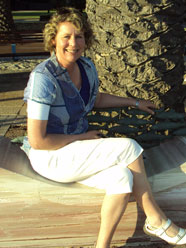 Sharon Duthie
Sharon Duthie
Ashburton ambulance officer and Intensive Care Paramedic, Sharon Duthie, has unexpectedly found herself to be actively helping to answer these questions, when she was admitted to Christchurch Hospital Coronary Care Unit recently. As an inpatient, she volunteered to take part in the Multi-Ethnic New Zealand Study of Acute Coronary Syndromes (MENZACS) being carried out by the Christchurch Heart Institute (CHI), a University of Otago Christchurch Research Centre and the Auckland Heart Group.
The study, led by the CHI's Professor Vicky Cameron and Associate Professor Malcolm Legget of the Auckland Heart Group, looks into the genetic risk factors that play a part in heart attacks and angina, across a range of ethnic groups such as European New Zealanders, Maori and Pasifika.
Cameron, Head of the Genetics and Molecular Biology laboratory at the CHI said, “We are trying to get a picture of the main risk factors that contribute to heart disease in Māori, and Pacific Islanders, and if these differ from other New Zealanders. This includes what influences their likelihood to recover well or to have further heart issues, by looking at genetics and lifestyle risk factors, including diet and exercise.”
Duthie, who has lived all her life on a farm and has an active lifestyle but has smoked most of her life, unexpectedly found herself the patient in her own ambulance when she suddenly became gravely ill and had to be rushed to Ashburton Hospital on Saturday 16 December 2017.
Without warning the 52 year-old, collapsed onto the second stretcher inside the ambulance. At the scene her shocked colleague suspected a heart attack and took the ECG leads (heart monitoring) from the call-out patient and put them onto Duthie.
Duthie was transferred to Christchurch Hospital by Westpac Helicopter where she underwent successful surgery for a Stent, inserted into her right coronary artery. As an in-patient, jumped at the chance to participate in the MENZACS study.
“I am passionate about medical research, to actively find ways to improve healthcare. I hope others will benefit from my situation and become more aware of the big picture affecting heart health, such as the genetic influences as well as lifestyle choices and environments have on our heart health.”
The study is funded by the Heart Foundation of New Zealand.
